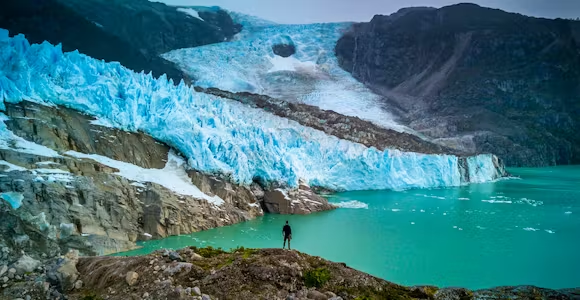
Aysen
Remote, beautiful and with one of the most famous road-trip roads in the world, Aysen is a destination for those seeking the very best of Patagonia without the crowds.
Discover MoreDeep roots in Patagonia: We are ex-guides, tour leaders, outdoor enthusiasts, & adventurers.
We’ve got our feet on the ground: Impartial advice, a bespoke service, and at no extra cost.
For the ends of the Earth: Sustainability is more than our carbon footprint (but we’re reducing that too).
Deep roots in Patagonia: We are ex-guides, tour leaders, outdoor enthusiasts, & adventurers.
We’ve got our feet on the ground: Impartial advice, a bespoke service, and at no extra cost.
For the ends of the Earth: Sustainability is more than our carbon footprint (but we’re reducing that too).

Lush temperate rainforest, waterfalls, snow-capped mountains, smoking volcanoes, glaciers, fjords and jaw-dropping beauty: Pumalín Douglas Tompkins National Park has it all. Hike the many trails through this park to experience a great diversity of landscapes, all in a part of Chile that's home to one of the country's most celebrated conservation projects.
.jpg?auto=format,enhance,compress&fit=crop&crop=entropy,faces,focalpoint&w=0&h=288&q=60)
Pumalín (or Parque Nacional Pumalín Douglas Tompkins to give it its full name) is one of Chile’s most beautiful national parks. It completely bisects the country, stretching across 994,332 acres (317,00 hectares) from the northern fjords across to the Argentinian border, with the Carretera Austral highway running along its western edge.
Most of the park is covered with verdant temperate rainforest. Moist Pacific air makes everything green: as much as four metres of rain falls here every year. Pumalín’s signature species is the mighty alerce tree, along with the lenga or southern beech. A quarter of all Chile’s alerces are found here – some of them as here are a towering 3000 years old, but when hiking to them there’s as much pleasure to be had in examining the rich ecosystems that thrive around them. Every patch of ground seems covered in mosses, ferns or buzzes with hummingbirds feeding from fuschias. This is a real biodiversity hotspot: half of all the plant species here are found nowhere else on earth
Much of the park is highly mountainous, with steep trails leading to the snow line or to the craters of volcanoes.
Pumalín is split into a north (norte) and south (sur) sectors. The south is the main area of hiking, while the north has no roads and can only be accessed by boat or on a sea kayak trip.
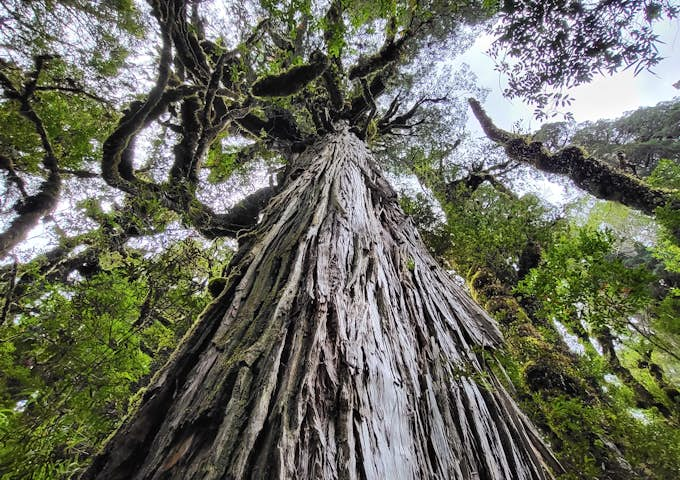
Giant alerce trees
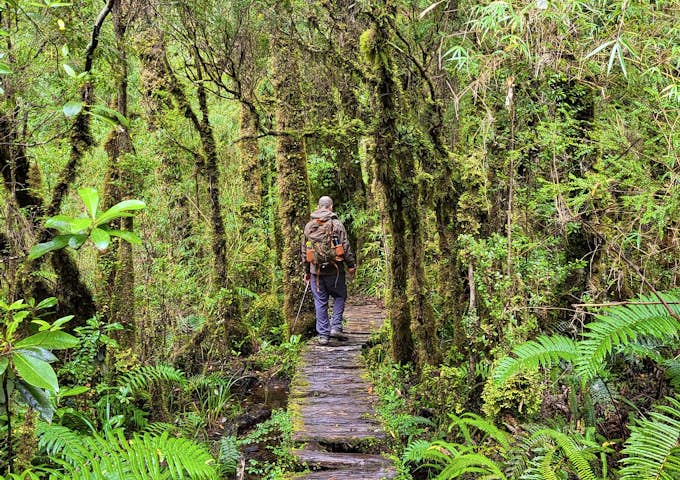
Hiking the Alerce Trail
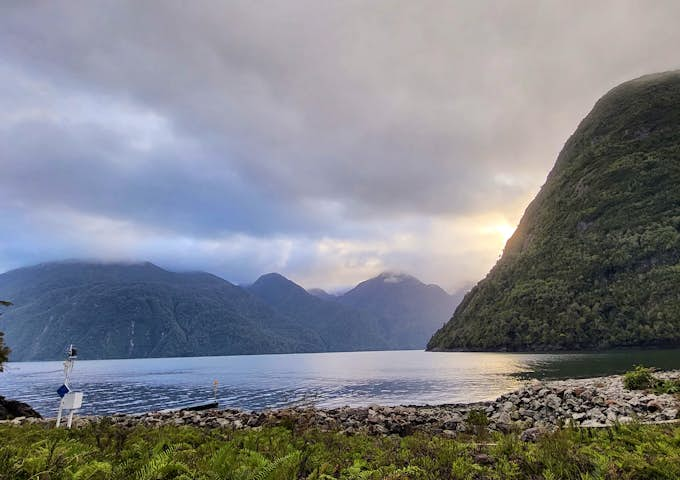
View of the fjords from Caleta Gonzalo
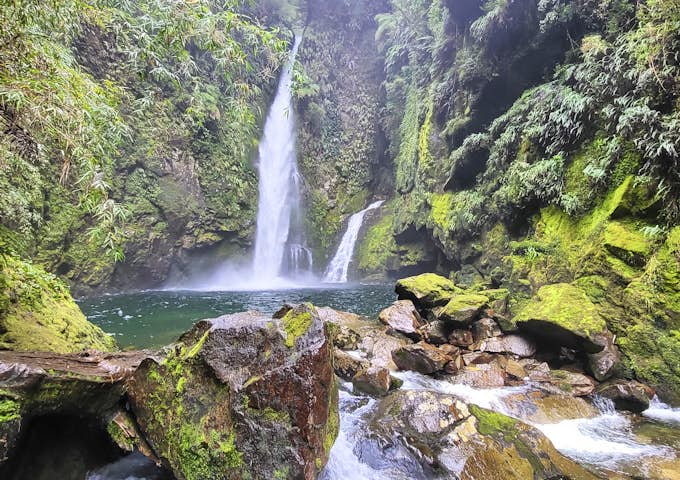
Cascada Escondidas
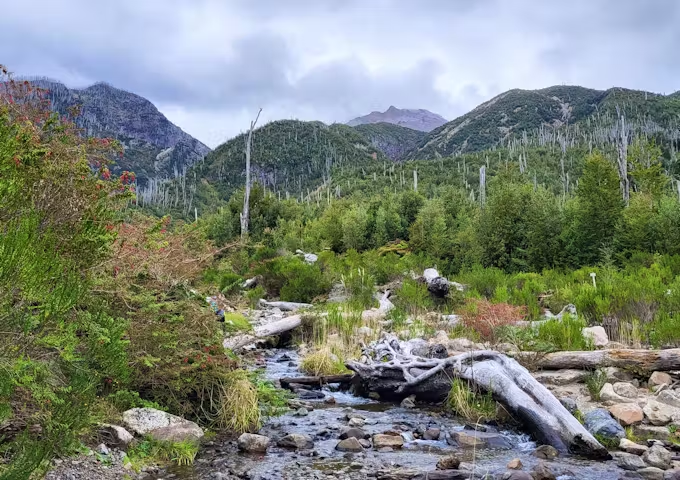
Forest regrowth on the Chaitén Volcano Hike
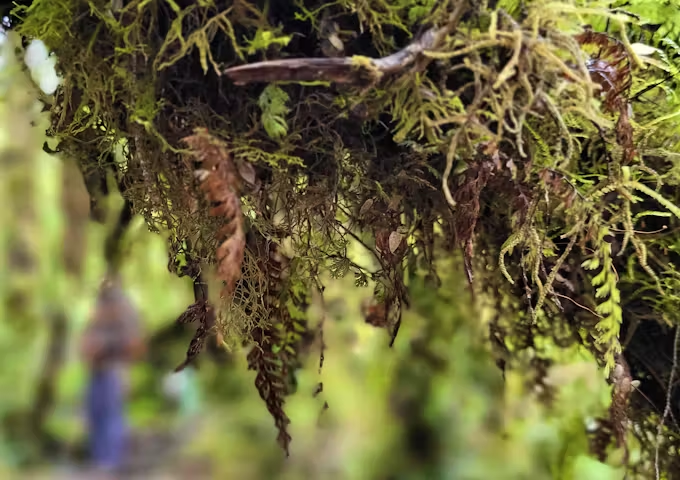
Lush growth in Pumalín's temperate rainforest
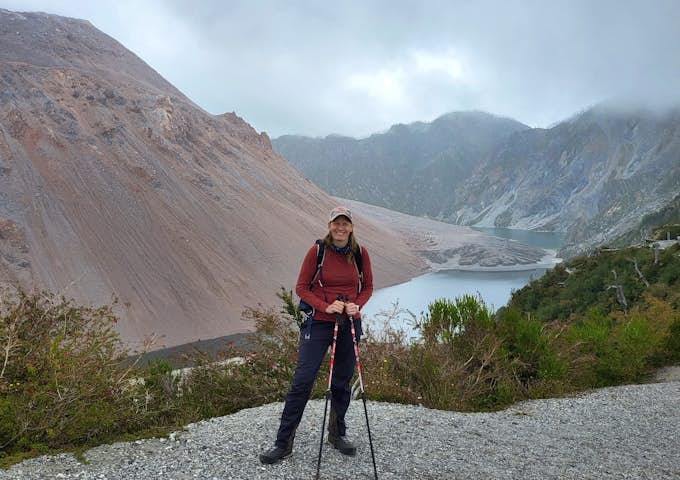
At the caldera of Chaitén Volcano
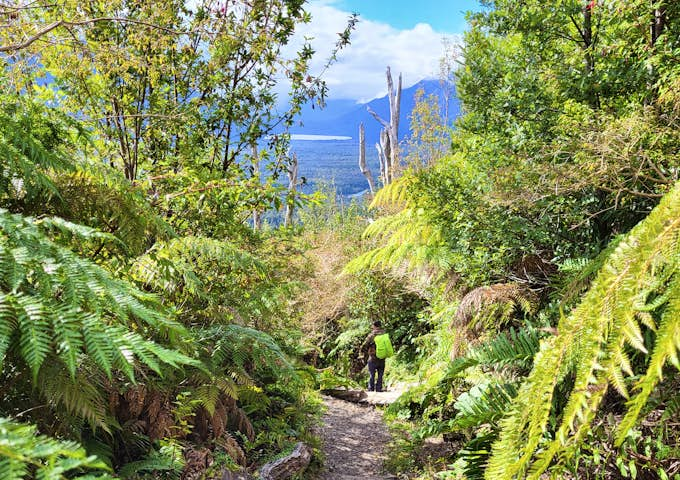
Descending on the Chaitén Volcano hike
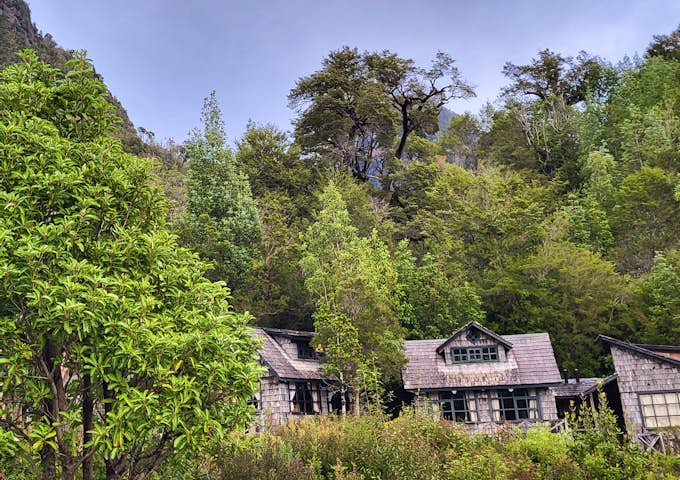
Caleta Gonzalo Lodge
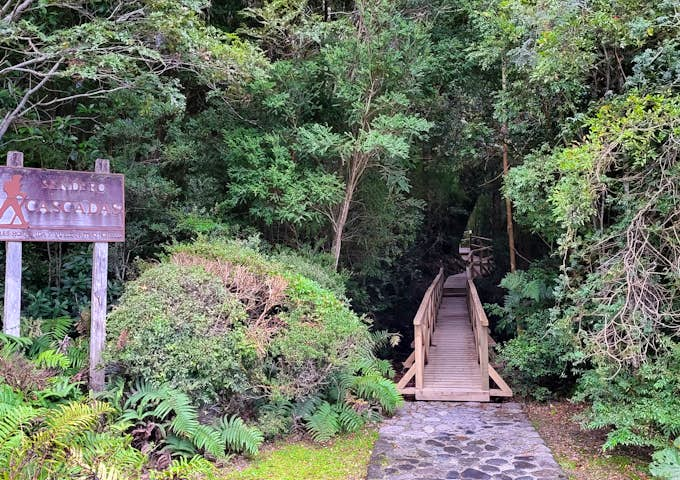
Start of the Cascada Trail

Glacier El Amarillo, Pumalín Park
Pumalín is a hiker’s paradise: you could easily spend several days exploring the trails here without backtracking.
A real must is the Alerce Trail to one of the oldest known trees in the world – an alerce that has been growing for around 3000 years. It’s a short walk easily accessible to those even on a self-drive trip through the park, but watch out for neck strain as you look up.
One of the most spectacular walks is the Chaitén Volcano Hike to the caldera of the volcano that laid waste to swathes of the park in 2008. Pumice and obsidian from the eruption are clearly visible on the ascent. The trail is well-marked and easy to follow – expect to see lots of flowers and hummingbirds as you walk through the open forest, and then spectacular vistas when you climb above the treeline to out down to distant Chaitén town.
Some of the most impressive waterfalls and plunge pools are to be found on the Cascadas Escondidas Trail. This is all about nature putting on a wild show, following a trail through lush overgrown forest. Be prepared for steep and sometimes muddy descents here, though the scenery is more than worth it. The Cascadas Trail is a simpler hike on boardwalks, leading straight out of Caleta Gonzalo.
Longer day hikes include the short Darwin’s Frog Trail with interpretation about ecosystem regeneration and the Hanging Glacier Trail to Volcán Michinmahuida.
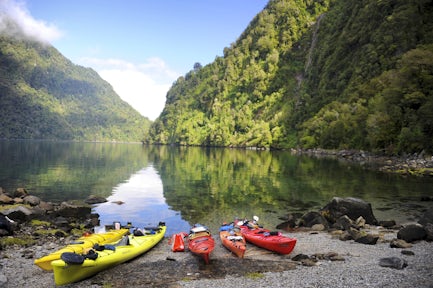
Kaying in Pumalín Douglas Tompkins National Park
Combine breath-taking scenery, sea lion colonies and waterfalls plunging directly into the sea by kayaking through Pumalín Norte. Access to this part of the park is entirely from the water.
Kayak trips leave from Puerto Varas with four days needed to access the best of the fjords. The added bonus of kayaking in Pumalín Norte is that you will spend at least one night camping next to natural thermal springs - a lovely way to relax your weary muscles after a day of paddling.
Kayaking in Pumalín is best enjoyed by people with some kayaking experience as some parts are exposed to the open sea. For novices, we recommend taking on the two-day kayaking options on the more protected (but equally dramatic) Reloncaví Fjord just a little further north.
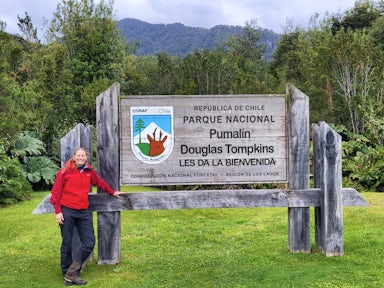
At the entrance to Pumalín
There’s a fascinating story behind Pumalín to discover while exploring its hiking trails. The wood of the alerce tree makes a particularly strong and durable building material, and much of this region was clear cut for logging and then given over to ranching.
Starting in 1989, the late US philanthropist and environmentalist Douglas Tompkins began buying land here to preserve and restore it, and had it declared a national sanctuary in 2005. In 2018, the land was handed over in its entirety to Chile to create the Parque Nacional Pumalín Douglas Tompkins: part of the largest donation of private land to a state in the world. It is now a central component of Chile's 1700 km-long Route of the Parks.
The park's main transport hub is at Chaitén. In 2008 the town was devastated when its eponymous volcano erupted, covering the town with and causing the closure of the park for several years. The town has now been completely rebuilt, along with the nearby town of Amarillo, which has become a centre for community regeneration projects as part of the post-volcano redevelopment of the national park and local economy.
The park is gorgeous and we didn’t come across any other people. Read the full review
Travelled: February 2023
Kelsey Freeman - USA
Review:
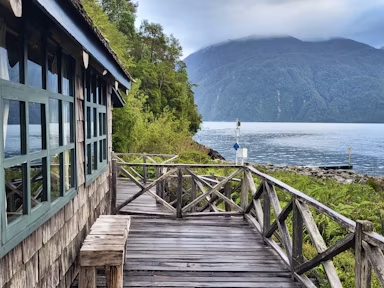
Caleta Gonzalo Lodge
Most visitors to Pumalín base themselves at Caleta Gonzalo in the northern part of Pumalín Sur. The Caleta Gonzalo Lodge is home to a series of simple but very cosy wooden cabins with balconies tucked into the forest and looking out over the fjords, allowing you to wake to the sound of birdsong and watch dolphins from your bed. Home-cooked food is served in the restaurant, with vegetables grown in the lodge’s garden. The lodge backs straight onto the Cascadas Trail, making it a perfect place for hikers.
There is very basic accommodation available in Chaitén, but if you prefer to rough it we would suggest instead to head straight into the park and stay at one of the seven superb campsites in the park. These have well-maintained facilities including shower blocks and kitchen areas. Wild camping is not permitted inside the camp.
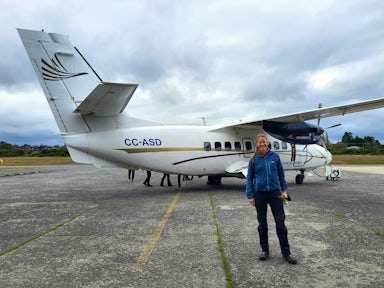
The plane to Chaitén from Puerto Montt
The best way to get to Pumalín is by air. There are daily flights (50 minutes) to Chaitén (code WCH) from La Paloma Aerodrome (code SCPF) in Puerto Montt. It’s important to note that this is separate from Puerto Montt’s main Tepual airport (code PMC).
Pumalín is considered the traditional starting point of the Carretera Austral, starting at Caleta Gonzalo and bisecting the park as it runs south. The region's main transport hub is at Chaitén, 56km south of Caleta Gonzalo, and 420km north of Coyhaique in Aysen.
There is a daily car ferry service between Hornopirén (for Puerto Montt and Puerto Varas) to Caleta Gonzalo (twice a day in high season), taking around six hours. Chaitén also has car ferry services several times a week to Puerto Montt (nine hours) and to Castro on Chiloé island (five hours).
Pumalín Norte is not accessible by road and can only really be reached by boat – including multi-day kayak trips that start from Puerto Varas.

Remote, beautiful and with one of the most famous road-trip roads in the world, Aysen is a destination for those seeking the very best of Patagonia without the crowds.
Discover More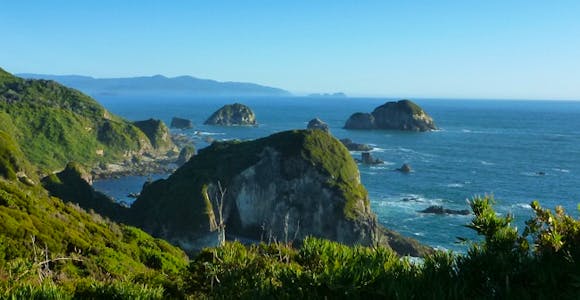
Chiloé Island is the perfect destination for anyone searching to get off the beaten track, for hiking in its dramatic coastal scenery and rich forests and exploring its unique …
Discover More
The Chilean Lake District is packed with glacial lakes, snow-capped volcanoes, islands rich in history and folklore, national parks and adventure sports activities.
Discover More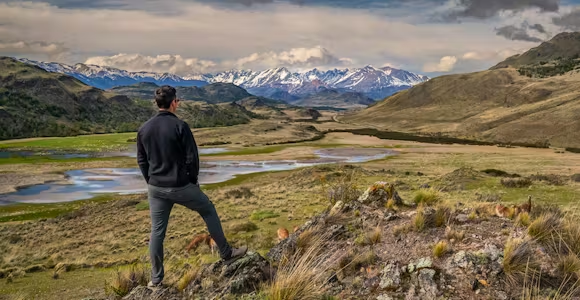
Explore the beauty of Chile’s greatest conservation project, where fences were torn down to recreate a thriving ecosystem amid spectacular valleys and mountain scenery.
Discover MoreHike up smoking volcanoes, climb granite peaks, trek past cascading emerald waterfalls or along forested trails. Be intrigued by the diversity of vegetation from million-year-old alerce trees, forests of monkey puzzle trees or the thick fairytale like vegetation of the temperate rain forests.
We'll spend some time listening to your aspirations, then discuss the kind of experience that might suit you.
Next we'll discuss the options, shortlist the best trips for you and present you our impartial recommendations.
We'll place a 24 hour hold on your preferred option - without obligation - whilst we talk through the details.
Whatever your budget, group size, length of stay, preferred activity or appetite for adventure, we can help.
1-888-970-4571This website uses cookies to ensure you get the best experience on our website. Privacy policy